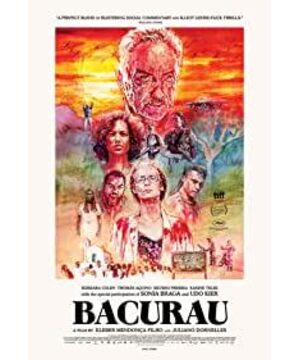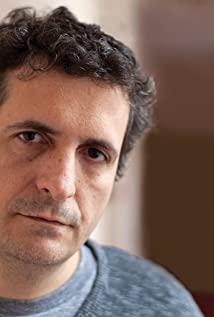{★★☆}
Much like the American independent film "Bakery Factory" that nobody saw last year, "Baclaw" is about the resistance of a self-contained small community in the face of the invasion of stronger power discourse. Under the lens of Chinese director Wang Peizhi, the community repertory troupe called on neighbours to resist the entry of pioneer artists who cannibalize the local art environment; under the gaze of Brazilian director Mendoza, the unknown town of Bakrau and his family attacked the mayor with guns. The hired mercenaries. Judging from the selection of materials, this theme can be very politicized. Just as "Bakery Factory" tries to influence the voting of neighborhood committees in a civilized way, "Baclaw" directly uses plasma to drown politicians' minions. The two movies themselves are either exposed or exposed. Connect with politics introvertedly. But I like "Bakery Factory" far more than "Baclaw". This is not because the former tells a story with a witty tone and the latter uses the logic of a cool film to make a savage legend, but because ——Let me talk about it below.
First of all, we cannot deny that the punk and rebellious nature of resisting the invasion itself makes the film about it have a cool aura, but unfortunately, with such a magical theme, "Baclaw" has chosen the most common entry. Point: To slaughter foreign enemies. In fact, the setting of the small town of Baklaw makes it difficult for its villagers to participate in any action other than torture. Many people say that God is unfolding, and I can't feel it at all. From the intentional or unintentional disclosure of the presence of armed soldiers at the beginning of the movie to the sniffing of a pair of mayors by the villagers, I guessed the next plot before reaching one-third of the movie: the mayor wanted to lose the chain in a pot, but instead Was served by the villagers. Please, this kind of tactics, Qian Yanqiu and his Condor series have already been used badly. Could it be that I have watched too many anti-Japanese dramas. However, when you see this, you will make a reasonable refutation. Why can't you make a good movie with the old-fashioned plot, your 007 series, the toilet series, which one can not close your eyes and silently write the script before entering the movie theater? That's quite right. But I wrote the first paragraph just to demonstrate: God unfolds, I am afraid not.
So we come to the second point, the enigmatic narrative of the entire movie "Baclaw". To start talking about this, we have to mention the new model of genre film mashup art film. As a movie enthusiast, I am very happy to see such new varieties appear on the big screen, because it means that it is not only the old commercial films and the boring literary films that are qualified to be called good films. Why can't a film that has both the acceptability of a genre film and the aesthetic height of an artistic film be a more adaptable masterpiece? But this is where the problem lies. Does the genre film mix and match the art film, does it mean that it does not have the commercial fluency of genre films and the sullen internal power of art films? I don't think so. If the two are combined, it means that it must have a stronger vitality, not only to withstand the nitpicking that genre films may face, but also to be subject to the same degree of scrutiny in the field of art films. This is harder to do and harder to achieve.
Has "Baclaw" done it? The answer is no. When I wrote the "Aquaman" film review, I said that in order to provide an instant access to audiences who have just walked into the movie theater’s brains, magic/sci-fi movies must quickly and accurately explain the world view of the story about to unfold. . Fast refers to the need to be dizzy, so that the audience can't think about the possible loopholes in it; accurate refers to the explanation must be clear and methodical. "Sea King"'s explanation of the underwater world and the seven royal families can be said to be a failure model, and it is vague.
Let's look at "Baclaw" now. Obviously, Bakrau is a small community that is almost self-sufficient and relatively isolated from the outside world. Such an alternative community should have shined for most audiences who are accustomed to urban life, but the film’s explanation of it is simply so rough. People are crazy. Not to mention that in addition to a relatively agglomerated small town, Bucklow also has scattered farms and individual households, and these things are not clear to you at all, and the portrayal of the characters is like a fairy tale. It seemed that every character showed his face, but every character did not have enough weight like a piece of paper. Suddenly, there was an assassin of a celebrity, but why an anonymous person in a small town where the bird did not shit was an assassin. I didn’t understand until the end. Suddenly, the crazy old lady turned out to be a lesbian, and her partner was there. Sex with a male prostitute; then suddenly, the one who is out of the village is a transgender person, and she is pretty cool. Throwing these elements together, what is the director's purpose? What are the implications of these marginal people's footnotes that I have missed?
On the other hand, the director used the mercenaries in the movie to say that they are Nazi. If the motif of Anarchism vs. Fascism can find some support in the form of politicians vs. villagers, then the white supremacy of mercenaries is completely inexplicable. Is that strongly related to movies? After all, the behind-the-scenes mayor is not white (similarly, this article can also be understood as a metaphor for Brazil's political interference by the United States, but are we really going to take political lessons here).
The mercenary in this film is another setting that makes the pupils dilated. Let us come to the third point: stupid mercenaries. When the mercenaries first appeared on the stage, the first turning point in the plot that should have given the audience a heads-up-the combat meeting was instantly made dumbfounded by their unfocused dialogue. A genre film that takes a violent route suddenly becomes a satire. They began to discuss whether Latin Americans were white, whether there were documents proving that mercenaries appeared in Brazil, and clarifying with a serious face that they never "hunted" with heavy weapons (should I applaud); the second time they were in the base, they Started to discuss who was more like an American, and started to argue about whether or not to feel guilty. Who can tell me why these conversations that make the facial makeup become stiff to the apple muscles are parachuted in a movie that does not seem to be one-dimensional? To give Mendoza a chance to laugh at the self-righteous America? Or is it to give the audience a chance to laugh? I don't even think there is any humor in these superficial, character generator-like characters. I only feel that I am kindly humiliated.
Furthermore, each of these mercenaries behaved very amateurishly, just like a few American tourists who came temporarily from Rio. ①In order to reflect the bloodthirsty craziness of these mercenaries, the two mercenaries started field battles on the spot after the mission was completed. It was a pity that they were not two male mercenaries. ②What is the purpose of cutting off the power? It seems to be telling the villagers with great fanfare: I am going to kill you. Just cut it, and waited all night, but in the end it was the day to start? I probably have a misunderstanding about the length of day and night in Brazil, after all, my geography is pretty bad. ③ I was idle and shot the school, but the exposed location was instantly killed by the villagers. I don't know much. Even if I underestimate the enemy, I won't be able to perform such a phenomenon-level operation that my junior high school classmates can't show when playing Call of Duty.
You might say that Mendoza's purpose is black humor. But these horrible humours that are deliberately gossiped about not only can't make people laugh, but also seriously neglect the tense atmosphere that the movie painstakingly create during the rest of the time. If this is indeed Mendoza's goal, then I am very worried about the direction of his future works. You might say again, why do you need to be so serious about logical issues. But this was the critical moment when the tip of the knife licked blood. Originally, the villagers' counter-kill was compressed to only a moment of pleasure. If they were not able to turn the tide and show the villagers' 18 martial arts, the reversal would hardly be successful. From the current finished product, Bakrau's victory is more like pure luck. Not only is the mercenary's stupid arrogance, but even the drugged sniper on the mountain, where his bullet will go more depends on uncontrollable factors.
Yeah, everything is so magical and incredible. But the magical realism of "Baclaw" is not only its aesthetic fig leaf, but also the last nail to seal its coffin. It's hard for me to defend the movie. I will tell you in reverse black and white that the magical realism of "Baclaw" is impeccable and natural. On the contrary, I think it is mediocre and a concept exchange. In fact, the most magical reality of the whole movie is its poster: flying birds in the sky, villagers standing ominously at the entrance of the tomb without saying a word, like the end of the day, and like a dream.
I think that truly good magical realism is a detached treatment that is detached from reality, but completely dependent on the mood of the characters or the tone of the story. Positive example: Argentine film "Zama" directed by Lucrecia Martel, chairman of the Venice jury in 2017. After watching "Baclaw", I became more and more aware that I underestimated "Zama", even if I had some criticisms about its script, its rich magical imagery was still deeply rooted in my mind: they are without exception. They are subtly misplaced with reality, sometimes even significantly, but they never made me feel that they escaped the loneliness and existential crisis that the male protagonist experienced in a foreign country. Looking back at "Baclaw", what do you see? UFO? Widescreen monitor? Voice translator? These things that are incompatible with the original and the barbaric use sharp edges and corners to cut the independent new world that the film intends to portray into tatters. This is not magic realism, it's just chaos and four differences.
I would not say that "Baclaw" is a bad film. Because whether it’s the hints that the plot faintly moves towards to you, or the fleeting good moments (funeral waving a white handkerchief, parody of violent aesthetics, etc.), I kept half a bucket of water from beginning to end. His patience and expectation to examine the gift that the movie will reveal to the audience. But unfortunately, my patience turned into a huge disappointment in the end, and the half bucket of water smashed, like the truck that was shot out in the film, and it spilled all over the floor. There is poetry here, but it is artificial and amateurish; there is also politics here, which can be symbolic and empty; f*cking hell also has stories here, just the more boring kind.
View more about Bacurau reviews










